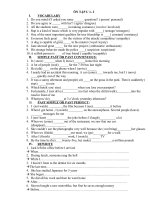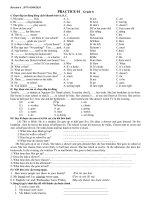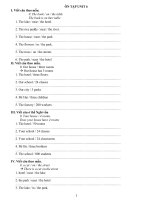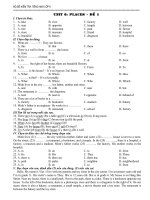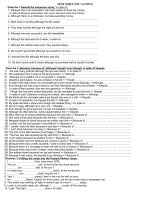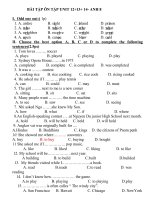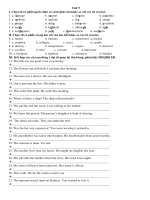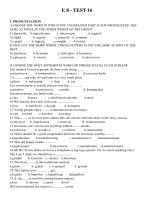On tap Unit 1 - Unit 3
Bạn đang xem bản rút gọn của tài liệu. Xem và tải ngay bản đầy đủ của tài liệu tại đây (67.38 KB, 3 trang )
REVISION TEST- FROM UNIT 1- 3
Choose the word whose underlined part is pronounced differently from the others.
1. A. chores B. dishes C. houses D. coaches
2. A. plates B. students C. friends D. mechanics
3. A. failed B. absorbed C. solved D. reached
4. A. wondered B. laughed C. replied D. cleaned
5. A. chores B. chair C. child D. chef
Choose the one word or phrase that must be changed in order for the sentence to be correct.
6. The world has enjoyed Beethoven’s music since nearly 200 years.
A B C D
7. He was drunk a cup of coffee when the telephone rang.
A B C D
8. After said goodbye to my parents, I went to school with my sister.
A B C D
9. The doctor advises me staying in bed, but it’s just so boring.
A B C D
10. The shop-keeper promised delivering the furniture to me this afternoon.
A B C D
Choose the most suitable word or phrase to complete each of the following sentences.
11. My parents don’t put pressure on me to make ………………………about what to study at university.
A. choice B. a decision C. a reply D. determination
12. My sister an I always ……………………………our respect for our grandparents and our parents.
A. show B. express C. give D. have
13. We are a very ……………………family. All of us have very close relationship with one another.
A. close-knit B. strange C. friendly D. typical
14. Our parents join hands to give us a nice house and a happy home.
A. deal with B. manage C. help together D. work together
15. Every member in my family is very ……………of one another so we don’t have to worry a lot when problems come out.
A. careful B. supportive C. tired D. afraid
16. The household chore daughters often share with their parents is ………………….
A. making clothes B. painting C. washing dishes D. mending chairs
17. My Dad is always willing to give a hand ……………………cleaning the house.
A. of B. about C. in D. with
18. Who can suggest a good …………………to this problem?
A. result B. key C. solution D. answer
19. Children need a ……………………environment in their families.
A. careful B. care C. caring D. careless
20. My …………………in the family is helping my younger brother with his study.
A. task B. activity C. job D. responsibility
21. Our grandparents and parents often give us good ……………………on important matters.
A. ideas B. advice C. examples D. thoughts
22. The house looks so nice. Its owner must have a …………………nature.
A. romance B. romantic C. romanized D. romantically
23. After ten years of ………………………they got divorced.
A. marriage B. friendship C. work D. love
24. Women are still struggling for true …………………with men.
A. equality B. similarity C. balance D. sameness
25. It’s ……………………in Vietnam to eat “banh chung” on Tet holidays.
A. customary B. usual C. traditional D. familiar
26. A woman has to ………………more in marriage than a man.
A. determine B. sacrifice C. apologize D. equalize
27. It’s a ……………………to start the wedding ceremony in front of the altar.
A. habit B. tradition C. practice D. routine
28. People of the same ……………………easily live and work with one another.
A. size B. sex C. generation D. organization
29. Physical ………………………sometimes blinds us.
A. attractiveness B. attract C. attractive D. attractively
30. Is that a good mother who only cares about her………………………?
A. beautiful B. beautify C. beauty D. beautifully
31. Since I came here, I ………………………a lot of acquaintances
A. have had B. had C. have D. am having
32. Understanding and appreciating culture differences can help people avoid……………………….
A. accidents B. faults C. errors D. misunderstanding
33. Cultural differences can make people feel …………………, frightened or even insecure.
A. uncomfortable B. terrified C. inconvenient D. unreasonable
34. TONNY: “I have never seen such a perfect thing on you” CLARE: “………………………………”
A. Haven’t you? B. I am so happy C. Really? D. Thank you. That’s nice compliment
35. TOM: “………………………………”. - ANNA: “Thank you. I’m glad you like it.”
A. Congratulations! You have a beautiful motorbike. B. The motorbike is beautiful
C. Where did you buy this motorbike? D. I didn’t know you bought a motorbike
36. Body language is known as non-verbal ……………………………….
A. exchange B. communication C. expression D. mention
37. Speaking is not a ………………………………of non-verbal communication.
A. formal B. signal C. decent D. gesture
38. JOHN: “You shouldn’t shout in restaurants” – MARK: He ……………………………me not to shout in restaurant.
A. suggested B. advised C. offered D. said
39. CLARE: “I am sorry for being late”. - She …………………………for being late.
A. apologized B. regretted C. admitted D. denied
40. - LAURA: “What a lovely house you have!” - MARIA: “………………………………”
A. I think so B. Thank you. Hope you will drop in C. Of course not, it’s not costly D. No problem
41. JANET: "Do you feel like going to the cinema this evening?" - SUSAN: " …………………………… "
A. I don't agree, I'm afraid B. You’re welcome C. I feel very bored D. That would be great
42. Some people are often …………… at the differences that exist between their own culture and the culture in the other country.
A. happy B. surprised C. good D. strange
43. I think you ought to ……………………… to your brother-in-law.
A. sorry B. excuse C. thank D. apologize
44. While studying he was financially dependent ………………………….his parents.
A. on B. to C. of D. from
45. Although I spoke to him many times, he never paid any ……………………… to what I said.
A. notice B. compliment C. informality D. attention
46. He was taught to remember that it was ……………………to interrupt.
A. rude B. polite C. appropriate D. potential
47. After Nancy …………for twenty minutes, he began to feel tired.
A. has jogged B. had jogged C. jogging D. jogged
48. ………………a car when they were living in London?
A. Have they B. Did they have C. Were they having D. Have they had
49. Tom ………………that same car since I …………….him in 1999
A. has driven/knew B. drove/ knew C. drives/ knew D. drove/have known
50. Jame …………… the check and ………………it to Dr. David yesterday
A. signed/had given B. signed/ giving C. signed/gave D. had signed/gave
51. John warned ……………………anyone what he had told me.
A. that I didn’t tell B. me not to tell C. me to tell not D. that told not
52. They asked me …………………………….in Los Angeles then.
A. whether was my father working B. if my father was working B. whether my father had been working D. was my father working
53. They said that they had come back ……………………….
A. the following day B. the day after tomorrow C. the next day D. the previous day
54. Peter said that if he ………………………… rich, he ………………………a lot.
A. is – will B. was-would have traveled C. were – would travel D. had been–would have traveled
Choose the correct sentence which has the same meaning as the given one.
55. The last time I saw Jane was three years ago.
A. I have seen Jane for three years. B. I haven’t seen Jane since three years.
C. I haven’t seen Jane for three years. D. I haven’t seen Jane three years ago
56. I haven’t seen that man here before.
A. It’s the first time I had seen that man here B. It’s the first time I have seen that man here
C. It’s the first time I saw that man here D. It’s the first time I have been seeing that man here
57. She started learning English ten years ago.
A. She has not learnt English before. B. She has learnt English since ten years.
C. She has started learning English for ten years. D. She has learnt English for ten years.
58. My friend told me, “If I were you, I would not smoke so much.”
A. My friend advised me not to smoke so much. B. My friend suggested not smoking so much.
C. My friend warned me against smoking so much. D. My friend prohibited me from smoking so much.
59. “I will pay back the money, Gloria.” Said Ivan.
A. Ivan apologized to Gloria for borrowing her money. B. Ivan offered to pay Gloria the money back.
C. Ivan promised to pay back Gloria’s money. D. Ivan suggested paying back the money to Gloria.
60. by certain actions / body language / ideas or thoughts / transmit /
A. Ideas or thoughts transmitted body language by certain actions
B. By certain actions, ideas or thoughts transmitted body language
C. Transmitting ideas or thoughts by certain actions causes body language
D. Body language transmitted ideas or thoughts by certain actions.
Choose the word or phrase that best fits the blank space
In many cultures, people think that …………61………and marriage together – like bread and wine or meat and ………62……. They
think that love is a necessary foundation for …………63……….and that you should love the person you marry before you get married. In
other ………64………., however a man and a woman may not even know each other before their wedding day. Romantic love is not
bequeathed to marriage in these cultures. These people expect that love will develop ………65……….the wedding if the marriage is a
good one. Your views on love and marriage come from your culture.
61. A. family B. friendship C. feeling D. love
62. A. tomatoes B. apples C. potatoes D. oranges
63. A. divorce B. marry C. engagement D. marriage
64. A. cultures B. societies C. counties D. habits
65. A. before B. after C. during D. as soon as
Read the passage carefully, then choose the correct answer.
Greetings in all languages have he same purpose: to establish contact with another person, to recognize his or her existence
and to show friendliness. The formulas for greeting are very specific and usually do not carry any literal meaning people say “
Good morning “even if it is a miserable day and may reply to “How are you?” with “Fine, thanks” even if they aren’t feeling well.
Closings, like greeting s are commonly used to exchange with no literal meaning. People who are leaving each other
permanently or for a long time shake hands or embrace, depending on the relationship. If you are in an unfamiliar situation and
wonder what to do. Watch other people or ask.
It is interesting, and sometimes very important to learn about the standards of courtesy in different cultural areas of the
world so that we can practice them well and avoid awkwardness in case we get a chance to visit a person or a community of
unfamiliar social customs.
66. Which of the following is NOT mentioned in the passage as a purpose of greetings?
A. To create contact with the person being greeted. B. To show that you recognize his or her present
C. To show that you admire him or her. D. To show that you are willing to be his or her friend.
67. Which of the following is a characteristic of the formulas for greeting?
A. literal B. specific C. usual D. common
68. In what way are closings similar to greeting?
A. They are common B. They are exchanges C. They are familiar D. They have no literal meaning
69. According to the passage, what should you do when you are in an unfamiliar situation?
A. Observe what other people do B. Use formulas you know. C. Wonder what you should do D. Ask your friends for help
70. Which of the following is a benefit of learning about the standards of courtesy in a different cultural area?
A. You can act comfortably hen you have a chance to visit the community
B. You can have a chance to visit a community of unfamiliar social customs
C. You can practice meeting with people from different cultural areas
D. You can avoid meeting with a community of unfamiliar social customs

